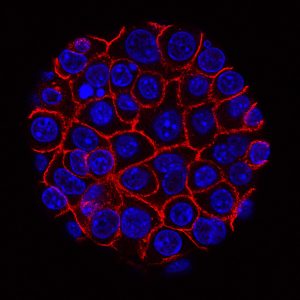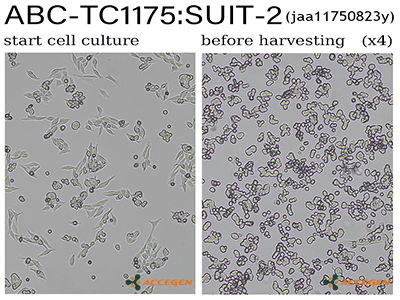Featured Products
Explore Products- In-Stock Tumor Cell Lines
- Human Orbital Fibroblasts
- Human Microglia
- Human Pulmonary Alveolar Epithelial Cells
- Human Colonic Fibroblasts
- Human Type II Alveolar Epithelial Cells
- Human Valvular Interstitial Cells
- Human Thyroid Epithelial Cells
- C57BL/6 Mouse Dermal Fibroblasts
- Human Alveolar Macrophages
- Human Dermal Fibroblasts, Adult
- Human Lung Fibroblasts, Adult
- Human Retinal Muller Cells
- Human Articular Chondrocytes
- Human Retinal Pigment Epithelial Cells
- Human Pancreatic Islets of Langerhans Cells
- Human Kidney Podocyte Cells
- Human Renal Proximal Tubule Cells



 The population doubling time of SUIT-2 is about 31.1 hours when it grows in tissue culture, and it can be passaged in the serum-free medium using 0.05% trypsin solution in PBS(-). When SUIT-2 is transplanted in the nude mice, the metastasis to the regional lymph nodes is confirmed. Observed by electron microscope, SUIT-2 showed a characteristic of pancreatic ductal epithelium. SUIT-2 produces several tumor markers, such as carcinoembryonic antigen (CEA), carbohydrate antigen 19-9, CSPG2/versican, and Mac25/angiomodulin.
The population doubling time of SUIT-2 is about 31.1 hours when it grows in tissue culture, and it can be passaged in the serum-free medium using 0.05% trypsin solution in PBS(-). When SUIT-2 is transplanted in the nude mice, the metastasis to the regional lymph nodes is confirmed. Observed by electron microscope, SUIT-2 showed a characteristic of pancreatic ductal epithelium. SUIT-2 produces several tumor markers, such as carcinoembryonic antigen (CEA), carbohydrate antigen 19-9, CSPG2/versican, and Mac25/angiomodulin.
